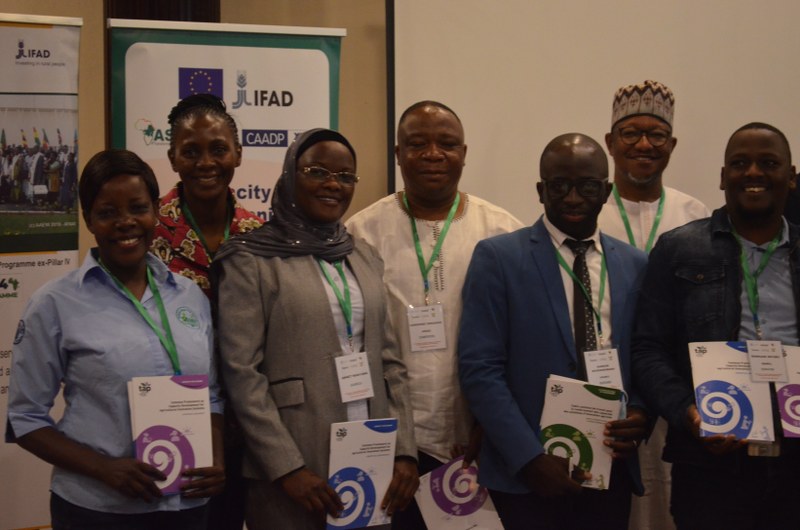
Nairobi Kenya: The Training of Trainers integrating the Tropical Agricultural Platform Framework (TAP) into African Research and Extension Organizations was held on 23rd March to 25th March 2022 at Hilton Hotel Nairobi Kenya. The training was organized by FAO’s Research and Extension Unit, together with CAADP XP4 organizations (The African Forum for Agricultural Advisory Services (AFAAS), Association for strengthening Agricultural Research in Eastern and Central Africa (ASARECA), Centre for Coordination of Agricultural Research and Development for Southern Africa (CCARDESA), Forum for Agricultural Research in Africa (FARA) and the West and Central African Council for Agricultural Research and Development (CORAF).
The Overall objective of the Training was to enhance capacity of the African CAADP-XP4 Organizations to adapt and promote TAP common framework and tools in supporting countries in Africa to unleash their potential for innovation.
The TAP-AIS project also aims to strengthen countries’ AIS by promoting the common framework for Capacity Development for Agricultural Innovation System, an approach developed by the Tropical Agricultural Platform, a global consortium initiated by the G20 in 2012. The common framework includes tools, assessment methodologies and operational guidelines for practical use. This action will support the transformation of national AIS, through strengthened regional and national research, extension and advisory organizations in these regions.
According to Per Rudebjer, the Capacity Development Specialist at FAO, Agricultural Innovation is not just technologies but also Public -private partnerships, organizing farmers in cooperatives, multi-stakeholder platforms for value chain development, financial mechanism and policy.
Dr. Warinda Enock the executive Director of ASARECA in his welcome remarks emphasized that the training will help CAADP-XP4 institutions appraise themselves with the CAADP-XP4 tools, frameworks, arrangements, and networks of capacity gap assessment that can be scaled up to their countries.
“The training will help CAADP-XP4 institutions meet the DeSIRA objective which focuses on capacity development goals with funding from the European Union.” He said.
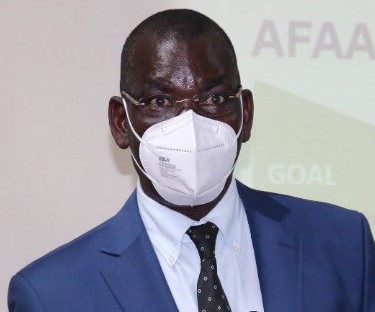 Mr. Max Olupot, the Partnerships, Planning and Learning Specialist at AFAAS, said that the ideas behind the Tropical Agricultural Platform are very logical in a way that it brings the world together to talk about agriculture with one voice which is Agricultural Innovation Systems and that is where the CAADP-XP4 institutions should anchor their efforts “We ought to embrace Capacity development for Agricultural Innovation Systems CDAIS tools to add on what we are already doing in a more consciously and structured way. The Tropical Agricultural Platform is specifically targeted to the improvement of the livelihoods of small holder farmers, but we cannot do this alone. we need partnerships and collaborations” He said.
Mr. Max Olupot, the Partnerships, Planning and Learning Specialist at AFAAS, said that the ideas behind the Tropical Agricultural Platform are very logical in a way that it brings the world together to talk about agriculture with one voice which is Agricultural Innovation Systems and that is where the CAADP-XP4 institutions should anchor their efforts “We ought to embrace Capacity development for Agricultural Innovation Systems CDAIS tools to add on what we are already doing in a more consciously and structured way. The Tropical Agricultural Platform is specifically targeted to the improvement of the livelihoods of small holder farmers, but we cannot do this alone. we need partnerships and collaborations” He said.
Background
In 2020, The African Forum for Agricultural Advisory Services (AFAAS), the Association for strengthening Agricultural Research in Eastern and Central Africa (ASARECA), the Centre for Coordination of Agricultural Research and Development for Southern Africa (CCARDESA) jointly carried out a capacity gaps assessment for their secretariats, regional and national partners and it was further recommended that there was need to build capacity in AIS.
In Addition, the Forum for Agricultural Research in Africa (FARA) and AFAAS jointly carried out a rapid appraisal in 2021 of initiatives aimed at strengthening Agricultural Innovation System in Africa which was focused on Functional Capacity Development, with a view of exploring ways in which regional Research and Extension Organizations can support the development of this capacities.
This Training of Trainers Course is part of the joint action plan developed by the Five CAADP-XP4 Organizations as a result of the assessments and the Appraisal.
Sessions
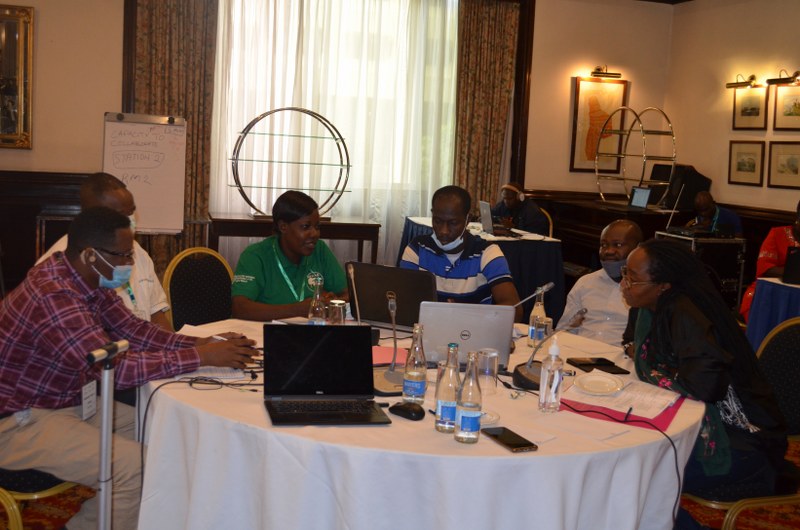 The first session started off with a conceptual understanding of the Agricultural Innovation systems (AIS), with a presentation on introduction to AIS approaches. participants were divided into sub-regional groups to discuss and describe how the Agricultural Innovation Systems in their respective African sub-region is structured, discuss its strength, weaknesses and perhaps missing elements in each sub-region. The objective of the exercise was that each participant would start reflecting on what an AIS is, using their own professional experience and sub-regional context. The exercise would bring about the conceptual understanding of the AIS approach, and initiate thinking on how capacity development could accelerate agricultural innovation processes in the sub-region and as well as map out the characteristics of the sub-regions AIS that may be important to capacity development interventions in the CAADP-XP4 context.
The first session started off with a conceptual understanding of the Agricultural Innovation systems (AIS), with a presentation on introduction to AIS approaches. participants were divided into sub-regional groups to discuss and describe how the Agricultural Innovation Systems in their respective African sub-region is structured, discuss its strength, weaknesses and perhaps missing elements in each sub-region. The objective of the exercise was that each participant would start reflecting on what an AIS is, using their own professional experience and sub-regional context. The exercise would bring about the conceptual understanding of the AIS approach, and initiate thinking on how capacity development could accelerate agricultural innovation processes in the sub-region and as well as map out the characteristics of the sub-regions AIS that may be important to capacity development interventions in the CAADP-XP4 context.
The second session was focused on Putting concept into practice-unpacking innovation using case studies. This session was led by Ms. Manuela Bucciarelli, Monitoring and Evaluation Expert-FAO with an introduction to an exercise; Exploring the innovation process using case studies. Three different case stories were analyzed with guiding questions within groups(sub-region). The participants were expected to analyze three different innovation cases/scenarios to see real applications and examples of the concept of Agricultural innovation system in real world.
The objective of the exercise was to ensure that each participant would start reflecting on a specific situation and problem, trying to unpack the different elements of an innovation. This would hence bring about a conceptual understanding of what an innovation process is, the approach, the actors involved and would expose the participants to a preliminary reflection of what capacities are needed to accelerate agricultural innovation processes in those particular contexts.
The exercise also allowed participants to compare different situations and challenges that led to different solutions/innovations and how different actors involved reacted. While doing this exercise, the participants were expected to be able to relate the concept of AIS to real situations and realities on the ground and be able to describe an AIS, its key elements and how it facilitated the innovation process.
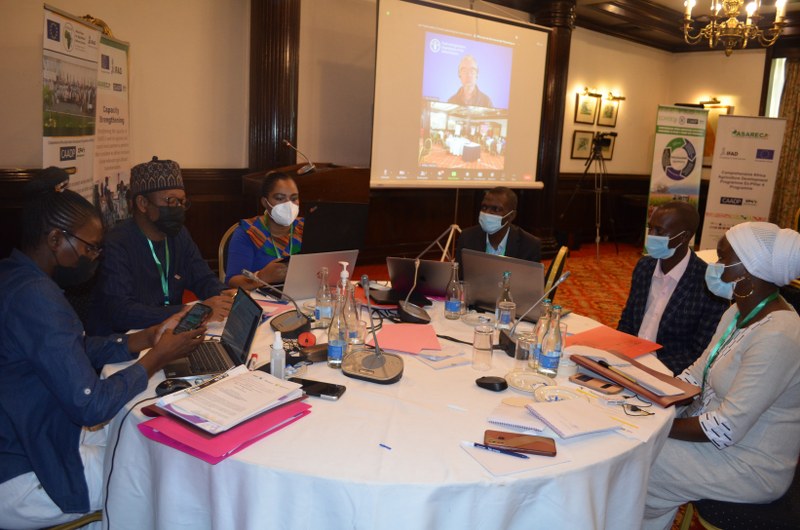 The third session focused on the introduction of the TAP capacity development framework for AIS led by Delgermaa Chuluunbaatar, the Agricultural Research officer at FAO. The participants were randomly placed in different groups and were expected to explore and describe how functional capacities are used in innovation processes (role and value addition of functional capacity,)
The third session focused on the introduction of the TAP capacity development framework for AIS led by Delgermaa Chuluunbaatar, the Agricultural Research officer at FAO. The participants were randomly placed in different groups and were expected to explore and describe how functional capacities are used in innovation processes (role and value addition of functional capacity,)
The objective of the exercise was that each participant develops clear understanding of functional capacities, and how they contribute to the innovation processes. The participants reflected on different moments of innovation case chosen and were able identify important role of capacity, with focus on functional capacities in solving problems and overcoming challenges among different actors hence able to appreciate the importance of developing functional capacities towards accelerating agricultural innovation processes. Additionally, the participants were able to gain good understanding on how functional capacities play a role.
The session targeted Capacity development approaches and tools for strengthening AIS.it was led by Manuela Bucciarelli, who presented on the Overview of the TAP tools and how they can contribute to addressing different aspects of innovation processes.
“ TAP has developed a set of tools to be used in each of the CD for AIS steps to assess capacities, monitor and evaluate CD interventions the TAP toolbox consists of 13 tools in the form of factsheets that are available on: www.tapipedia.org/framework/cd-tools” Says Manuela.
During this session, four groups of participants were introduced to a selected set of 8 tools from the TAP common framework tool box as applied to four functional capacities for innovation processes in specific case study. The session initiated the participants in a reflection process on how instrumental the tool box is in developing functional capacities and accelerating agricultural innovation processes.
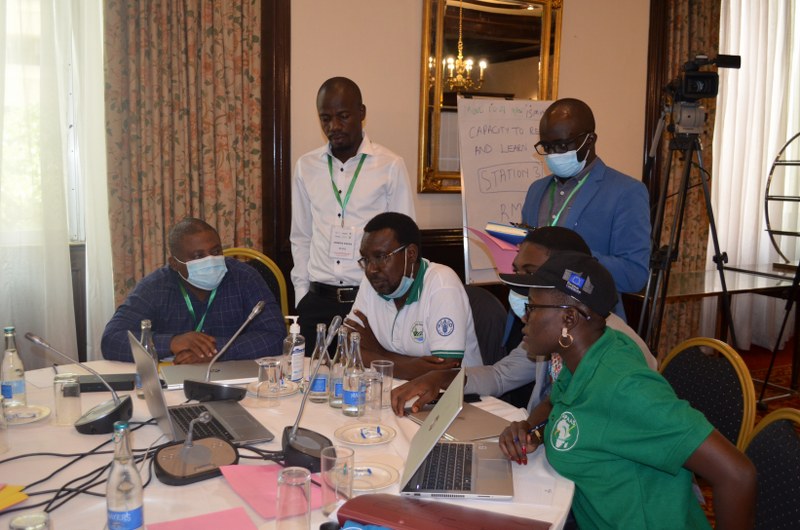
The objective of the exercise was to enable participants develop a clear understanding of how each tool can be used and the results they produce for a given functional capacity and reflect on the capacities they already possess and/or need to develop in order to facilitate innovation in agriculture.
Session 5 focused on using the TAP common framework to strengthen innovation systems in Africa. In this third and final day, the participants were led through an interactive session on what it takes to be an infective trainer and how to facilitate learning. This was led by Ms. Martina Spisiakova-APAARI. This was a mixed group discussion were participants had to reflect on there capacities and experiences. Dr. Pricilla Henriquezm, Advisory Council Member-FFAR, led a group discussion exercise on the Operationalizing Training of Trainers.
The objective of the exercise was to enable participants prepare two action items that will aid them to put in practice the concepts learned in the ToT, specifically related to agricultural innovation and functional capacities required to facilitate innovation processes.
The exercise aimed at ensuring that each participant reflects on the capacities that he or she already possessed and /or needed to develop to facilitate innovation in agriculture, implement two concrete actions to carry out (1) at organizational level and (2) at the AIS /niche level when returning to their jobs and finally reflect on possibilities for course content and design for the ToT training they may develop in their countries. The participants in this session were expected to be able to apply the knowledge learned in this ToT in his or her job as a facilitators of innovation processes in agriculture, Understand the factors that may interfere with participants in trying to use on the job what they learned in the training and also offer opportunity for the ToT organizers to follow up the results of the training

